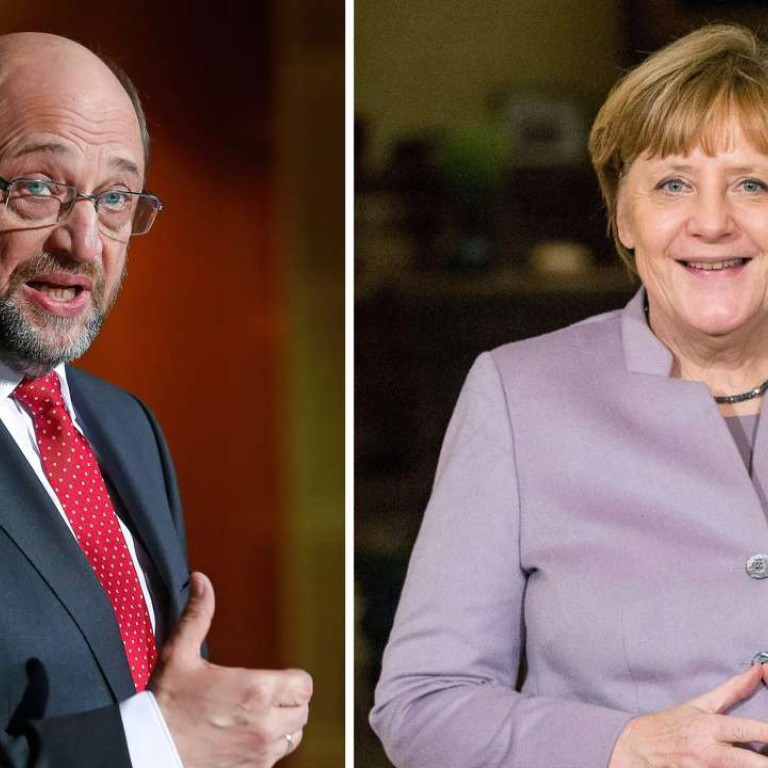
Can 'man of the people' Martin Schulz oust Angela Merkel as German chancellor?
He had been well on his way to becoming a professional footballer when a meniscus tear put paid to his dreams and he fell into a state of depression, alcoholism and chain-smoking. Now, more than 42 years on, Martin Schulz is presenting the fiercest opposition yet to Angela Merkel’s attempts to win a fourth term as German chancellor.
The 61-year-old, who is returning to his homeland after 23 years in the European parliament – acting as its president since 2012 – is seen as offering the Social Democratic party (SPD) the best chance in years to reverse its fortunes, following a period of falling membership and poor electoral performances.
Schulz on Sunday was expected to unveil his battle plan to challenge Merkel in Germany’s general election in September, hoping a wave of popularity will help him shake up the race.
“I want to be chancellor,” he told the news weekly Der Spiegel on Saturday.
“I have worked with Angela Merkel longer than almost anyone outside her party,” he said.
“I have studied her, got to know her.”
Although his chances of ousting Merkel in September are slim, Schulz’s challenge has been widely interpreted as a step towards undoing voter disenchantment and limiting the number of protest votes going to the rightwing populist party Alternative für Deutschland.

The autodidact, conservative social democrat, who is proficient in six languages, offers the SPD an opportunity to emerge from the shadows of Merkel’s conservative alliance, in which the party has served since 2013, more or less losing its identity in the process. It is still suffering from a dramatic drop in support, in punishment for widespread labour reforms brought in under former chancellor Gerhard Schröder.
Schulz replaces Sigmar Gabriel, both as party leader and its main chancellorship contender, after Gabriel said earlier this week that he would stand down in the face of Schulz’s popularity.
His main selling point is that he offers an alternative to Merkel, who is still popular but looks increasingly stale and has come under attack for her refugee policy .
Polls published last week, which asked Germans who they would choose if they could vote directly for a chancellor, put Schulz and Merkel neck and neck at 41 per cent.
Heribert Prantl, a leading political commentator for the newspaper Süddeutsche Zeitung, said in an editorial that Schulz’s main challenge would be to “show he is more than just hot air. At the same time, the SPD as a party that bobs up and down in a permanent state of stagnation is one that will be grateful for any wind it can get.”
The Bild newspaper said Schulz’s strengths were Merkel’s weaknesses, namely “strong, emotional performances and clear language”. His main advantage is that he is untarnished on the Berlin political scene, having never been active there.

Schulz’s surprise entry into the domestic arena last week was the first news event for days to knock Donald Trump from the top of the headlines in Germany.
The politician, referred to as a “man of the people”, dropped out of high school and later, after his slump into depression, lost his job and narrowly escaped eviction. His brother, a doctor, is said to have rescued him from complete self-destruction. He has been teetotal since 1980.
Schulz was born in the West Rhineland village of Hehlrath to civil servant parents, whose political allegiances were divided between the SPD and the Christian Democratic Union (CDU). He has been married for 30 years and has two grown-up children.
Before entering politics, Schulz trained as a bookseller and is known to be a voracious reader, with a penchant for historical biographies; he has cited the works of Eric Hobsbawm, John Steinbeck and Giuseppe Tomasi di Lampedusa as among his favourites.
His political career began in 1987 when he became the mayor of Würselen, near Aachen, a post he held for 11 years. Since 1994 he has been a member of the European parliament, and head of the SPD MEPs since 2000.
In 2012 he was elected to the post of president of the European parliament, with 409 out of 612 votes. In the same year he received the Nobel peace prize on behalf of the EU. He has been a member of the SPD’s executive committee since 1999.
In 2003, Schulz clashed with Silvio Berlusconi, criticising his domestic policy. In return, the then Italian prime minister said he would recommend Schulz to an Italian film producer looking to cast a concentration camp leader.
Seven years later, Schulz had a run-in with the British Ukip MEP Godfrey Bloom, who interrupted a speech he was giving on the European stability pact by quoting the Nazi slogan “One people, one empire, one leader” and calling Schulz an “undemocratic fascist”.
Despite the buzz surrounding Schulz, political watchers say he can be happy if his party manages to win anything close to the 25.7 per cent it secured in 2013. Merkel’s CDU is on course to secure about 33 per cent.
As many have been keen to point out, Schulz ran the European parliament in a similar grand coalition to that which currently exists in Berlin. Those hoping he will shake up the system in Germany might find he ends up participating in a similar model of governance.
Additional reporting by Agence France-Presse

